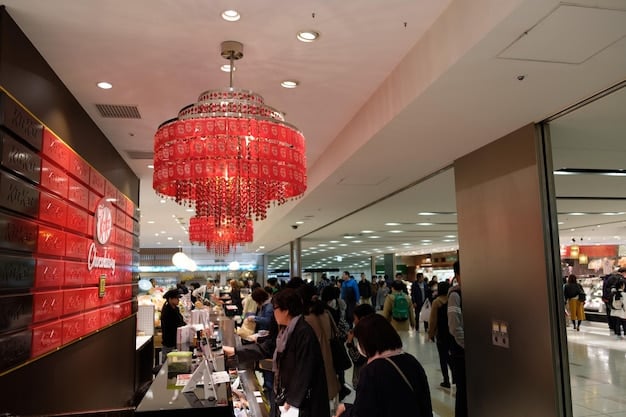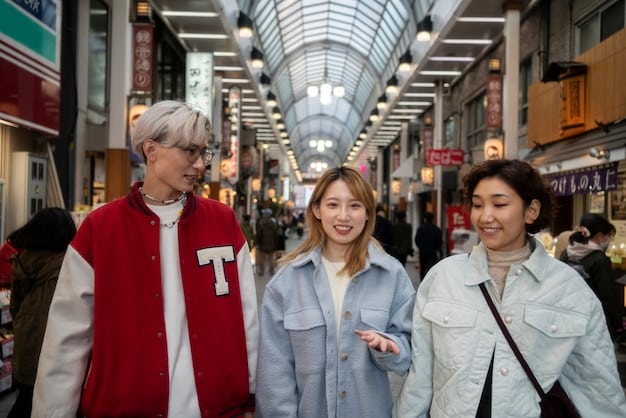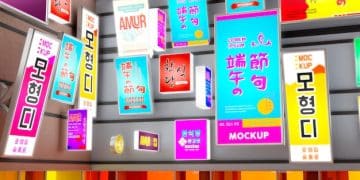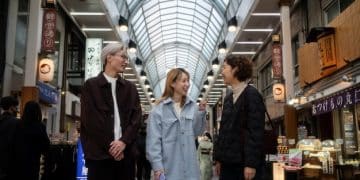Japanese Department Store Sales: Up to 70% Off Luxury Goods for US Shoppers

Navigating Japanese department store sales offers savvy US shoppers the chance to purchase luxury goods at discounts of up to 70%, requiring knowledge of sale seasons, tax-free shopping, and popular department stores.
Imagine finding that coveted designer handbag or high-end skincare at a fraction of the price. Navigating the world of Japanese department store sales: How US shoppers can snag luxury goods at up to 70% off is more than just a dream; it’s an achievable reality with the right strategies.
Understanding Japanese Department Store Sales
Japanese department stores, or “depatos,” are renowned for their impeccable service, vast selection of high-quality goods, and, of course, their sales. For US shoppers, understanding the nuances of these sales can unlock significant savings on luxury items.
Knowing when and where to look is key to maximizing your savings. From seasonal clearances to special promotions for foreign tourists, there’s a wealth of opportunities to snag incredible deals.
Key Sale Seasons in Japan
Understanding the timing of major sales events is crucial for planning your shopping trip. These seasonal clearances offer deep discounts across various departments.
- Summer Sales (July – August): Clear out summer merchandise to make way for autumn collections.
- Winter Sales (January – February): Offers the Biggest discounts on winter clothing, accessories, and home goods.
- Year-End Sales (December): A festive sale season that includes lucky bags (fukubukuro) with mystery items at incredible values
- Golden Week Sales (Late April – Early May): A series of national holidays offer promotions across all departments.
Popular Products to Buy During Sales
Knowing what items are typically discounted heavily during sales can help you focus your shopping efforts.
- Clothing and Accessories: Seasonal apparel, shoes, handbags, and jewelry.
- Cosmetics and Skincare: High-end Japanese and international beauty brands.
- Home Goods: Linens, kitchenware, and decorative items.
- Food and Confectionery: Gourmet food items and traditional Japanese sweets (wagashi).
Japanese department store sales offer a treasure trove of opportunities for US shoppers. By understanding the seasonality and timing, US shoppers can ensure they time their visit appropriately.
Tax-Free Shopping for Tourists
One of the biggest advantages for US tourists shopping in Japan is the availability of tax-free shopping. This can further reduce the cost of your luxury purchases.
By understanding the requirements and procedures for tax exemption, any US shopper can make sure to maximize the savings at the time of purchase.
Eligibility for Tax-Free Shopping
To qualify for tax-free shopping, you must meet certain criteria as a foreign tourist.
- Non-resident status: You must be a foreign tourist visiting Japan for less than six months.
- Passport presentation: You need to present your passport at the time of purchase.
- Minimum Purchase Amount: Most stores require a minimum purchase amount per day at the same store to qualify for any tax exemption. This amount is subject to change, so make sure it’s up to date.
The Tax-Free Shopping Process
Navigating the tax-free refund process at Japanese department stores is easy.
- Make Your Purchase: Shop for the items you desire and make your purchase at the retail store.
- Visit the Tax Refund Counter: After making your purchase, head to the tax refund counter.
- Provide Documentation: In order to get your refund, please provide your passport, purchase receipts, and the items you purchased to the staff at the counter.
With a better understanding of the tax-free shopping benefits, American shoppers can increase the savings found using the department store sales.
Top Japanese Department Stores for Luxury Goods
Not all Japanese department stores are created equal. Some are particularly known for their extensive selection of luxury goods and frequent sales.
Identifying and targeting these stores can greatly increase US shoppers’ chances of finding the best deals on high-end items.
Mitsukoshi Isetan
Mitsukoshi Isetan is one of Japan’s most prestigious department store groups, offering a curated selection of luxury brands and Japanese craftsmanship.
Located in major cities like Tokyo and Kyoto, each location offers a diverse range of high-end goods, from fashion and accessories to home goods and fine foods. The sales events are big across Japan.
Takashimaya
Takashimaya is another leading department store chain known for its upscale offerings and elegant shopping environment.
Takashimaya provides a mix of international luxury brands and Japanese designer labels. Don’t forget to check out the basement food halls, which offer gourmet treats and culinary delights.
Hankyu and Hanshin
Hankyu and Hanshin are two department store chains popular in the Kansai region, particularly in Osaka and Kobe.
These stores offer a wide range of products, from fashion and cosmetics to home goods and gourmet foods. Both are very active with sales and promotions throughout the year.

Strategies for Maximizing Savings
Beyond knowing the sales seasons and tax-free shopping rules, several strategies can help US shoppers maximize their savings at Japanese department stores.
These include leveraging loyalty programs, comparing prices, and being aware of return policies.
Loyalty Programs and Credit Cards
Many Japanese department stores offer loyalty programs that reward frequent shoppers with points, discounts, and exclusive benefits.
Some stores also partner with credit card companies to offer additional perks, such as bonus points or discounts on purchases, so make sure to always double-check.
Price Comparison and Negotiation
While negotiation is less common in Japanese retail settings compared to other countries, it’s always worth comparing prices across different stores and online retailers.
Checking if the store offers price matching or if there are any ongoing promotions can help save money.
Understanding Return Policies
Before making a purchase, it’s essential to understand the store’s return policy. Most Japanese department stores have strict return policies, particularly for sale items.
Ensure that you are completely satisfied with your purchase before leaving the store.
Maximizing savings at Japanese department stores requires a comprehensive approach. By combining knowledge of sales seasons, best practices for tax-free shopping, and the use of the store amenities, US shoppers will likely grab more of the products they want for less money.
Navigating the Cultural Nuances of Shopping
Shopping in Japan is not just about buying products; it’s also about experiencing the culture and etiquette of Japanese retail.
Understanding these cultural nuances can enhance your shopping experience and ensure that you are a respectful and informed customer.
Customer Service and Etiquette
Japanese customer service is renowned for its politeness, attentiveness, and attention to detail.
- Respectful interactions: Be polite and respectful to the staff, using appropriate language and gestures.
- Gift-wrapping: Take advantage of the store’s impeccable gift-wrapping services.
- Handling money: Avoid direct hand-to-hand exchange of money; use the provided trays.
Language Barriers and Assistance
While English is becoming more widely spoken in major tourist areas, language barriers can still pose a challenge.
- Learn basic Japanese phrases: Knowing a few basic phrases can go a long way.
- Use translation apps: Utilize translation apps on your smartphone to communicate with staff.
- Seek assistance: Don’t hesitate to ask for assistance from store staff; they are usually happy to help.
Shopping in Japan goes beyond getting deals, but the cultural experience is an entirely new experience. By understanding and respecting the cultural norms you will enhance your own shopping experience.
The Future of Shopping: Trends and Innovations
The retail landscape is constantly evolving, and Japanese department stores are at the forefront of innovation.
Staying informed about the latest trends and technologies can help US shoppers anticipate changes and adapt their shopping strategies.
E-Commerce and Online Sales
While physical stores remain popular, Japanese department stores are increasingly embracing e-commerce and online sales channels.
Many stores now offer online shopping with international shipping, allowing US shoppers to access sales and promotions from the comfort of their homes.
Virtual Shopping Experiences
Some department stores are experimenting with virtual shopping experiences, using VR and AR technologies to create immersive and interactive shopping environments.
These innovations can provide a new way for customers to browse products and make purchases from afar.
The future of shopping in Japanese department stores is dynamic and exciting. By staying informed about current trends, American shoppers can position themselves to take advantage of the latest technologies and opportunities, ensuring that they snag only the very best deals for high-end products.”
| Key Point | Brief Description |
|---|---|
| 🗓️ Sale Seasons | Time your visit for summer, winter, year-end, or Golden Week sales. |
| 🛂 Tax-Free Shopping | Present your passport for tax exemption on purchases. |
| 🛍️ Top Stores | Visit Mitsukoshi Isetan, Takashimaya, or Hankyu/Hanshin for luxury goods. |
| 🎎 Cultural Nuances | Respect Japanese customer service and etiquette. |
Frequently Asked Questions
▼
The best times are during the seasonal sales: Summer (July-August), Winter (January-February), Year-End (December), and Golden Week (late April-early May).
▼
As a tourist, you can get a refund on the consumption tax if you purchase over a certain amount. Show your passport at the store’s tax refund counter.
▼
Mitsukoshi Isetan, Takashimaya, and Hankyu/Hanshin are known for their luxury offerings.
▼
Negotiating prices is uncommon. Focus on comparing prices and checking for promotions.
▼
Learn basic phrases, use translation apps, or ask for assistance as store staff are keen to help you.
Conclusion
With careful planning and an understanding of Japanese shopping culture, US shoppers can indeed snag luxury goods at significant discounts in Japanese department stores. From seasonal sales to tax-free shopping, the opportunities for savings are abundant, making it a rewarding experience for savvy shoppers.





